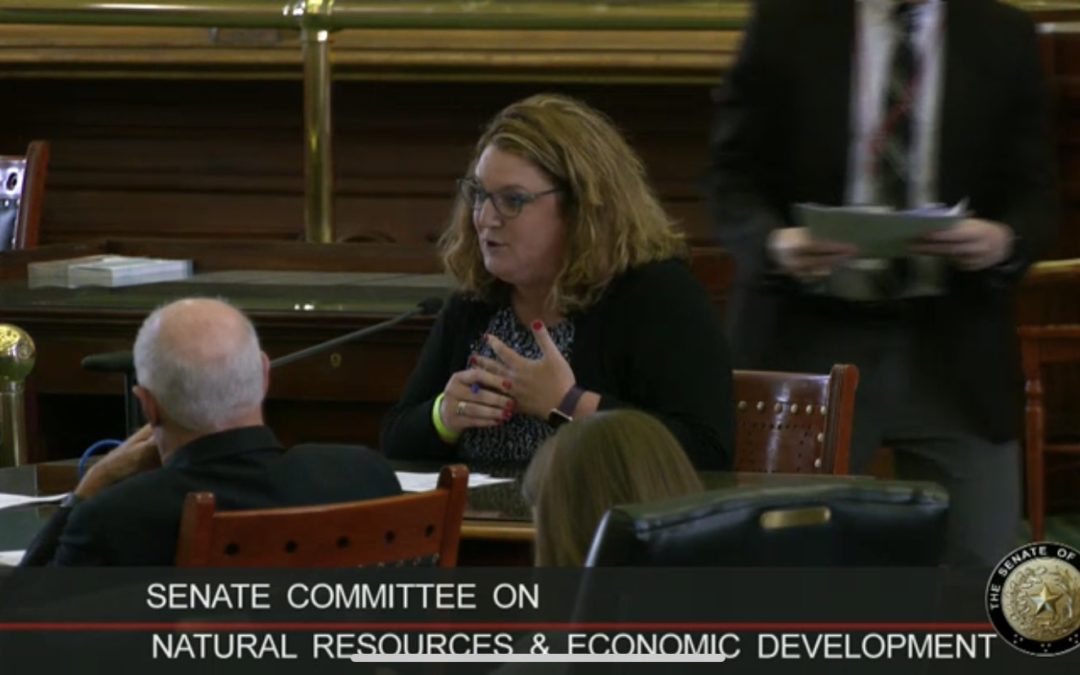Kim Kofron, Senior Director of Education with CHILDREN AT RISK, testifies in support of SB 599/ HB 4127 during the March 11, 2025 Texas Senate Health and Human Services Committee Hearing.
ADVOCATING IN SUPPORT OF SB 599/HB 4127
As the name implies, family home child care is simply an individual Texan providing care in his or her – usually her – home. These small businesses provide working parents with smaller, more personalized care right in their neighborhoods. Some home providers specialize in providing child care during night-time work hours or offer other flexible arrangements for wage workers
Home-based child care is everywhere in Texas and serves all kinds of working Texans. Many parents want to send their children to family child care homes that are closer to home or more culturally responsive. Parents in rural communities or working non-traditional hours often have no other options as center-based child care is not economically feasible in areas with low population and at non-peak times.
Texas has lost 18% of our family child care homes or 879 family providers since before the COVID-19 pandemic. The loss of child care only continues today as more programs close each month. Businesses are feeling the pinch. Employers in “child care deserts” with existing child care shortages and in rural communities rely on home-based child care providers, as do businesses operating during non-traditional hours. A drop in family home child care hurts employers, reduces profits, and creates a drag on the Texas economy.
THE PROBLEM
- Decrease in Child Care Providers: Texas has seen a significant loss of family child care homes since 2019, with nearly 900 providers closing. This loss is more pronounced in rural areas and “child care deserts”—areas with limited child care options.
- Economic Impact: The shortage of child care options affects parents, businesses, and the broader economy, particularly as parents struggle to find care for their children, impacting their ability to work.
- Local Regulations: Excessive local zoning and ordinances prevent home child care providers from opening or operating efficiently, exacerbating the problem.
THE IMPACT
- Workforce Shortages: Employers, especially in rural communities and those requiring non-traditional hours, face workforce shortages as working parents have fewer child care options.
- Economic Slowdown: As child care options dwindle, it impacts economic activities, particularly for small and mid-sized businesses that rely heavily on local employees.
THE SOLUTION
- Support SB 599/HB 4157
- Local Deregulation: The Texas Health and Human Services Commissions regulates and monitors the health and safety of child care centers in Texas. State child care regulations create a consistent and research-based standard statewide for the well-being of children. Unfortunately, some local ordinances and zoning can create huge hurdles for Texans wanting to create more family home child care for working parents.
- Support for Providers: By reducing regulatory hurdles, the bill helps more providers to operate, thereby increasing child care options and supporting working families.
- Economic Benefits: With more child care options, parents can work more consistently, aiding local businesses and boosting the economy.
READ MORE FROM C@R

Supporting Opportunity Youth for an Inclusive Economy
Despite a decades-long drop in the opportunity youth population, which decreased from 5.8 million to 4.4 million between 2011 and 2021, the number of opportunity youth rose dramatically during the pandemic to more than 6 million. The term opportunity youth (OY)...

Voices from the Field: Child Care Struggles Through COVID-19
Child care centers and family child care homes provide an indispensable resource to parents across Texas. Quality child care is crucial for the development and early education of young children. Despite the importance of this essential industry, child care centers are...

REPORT: Classrooms in Crisis
COVID-19 changed our public education landscape nearly overnight. Thousands of Texas schools and nearly 5.5 million students faced a school year like never before. Schools had to quickly develop tools andresources that would support the pivot to a virtual classroom...

C@R and Partners Present Third National Immigration Summit
This year, national advocates explored child-forward immigration policies, access to basic needs and mental health resources, education equity, and how to shift the narrative surrounding immigrants and immigration.On June 23, 2022, CHILDREN AT RISK hosted their third...

CHILDREN AT RISK Testifies to Texas House Committee on Child Care Priorities
On May 19, 2022, C@R Director of Education, Kim Kofron, provided testimony to the Texas House Committee on International Relations and Economic Development. The testimony shared data on child care closures: “Texas has lost 21% of child care providers from March 2020...

C@R Leads Learning Tour in Mexico City
In May, CHILDREN AT RISK hosted 20 guests in Mexico City for a human trafficking and immigration learning tour. The group spent a busy 4 days visiting with local organizations, touring cultural sites, and (of course) enjoying the food! The trip focused on exploring...
Stay Informed
Sign up for our Advocacy Action Alerts for updates during the legislative session, our latest research, policy analysis, and ways you can take action!
